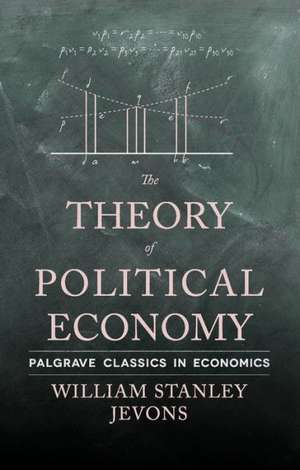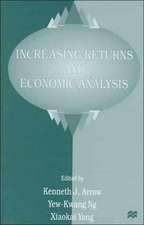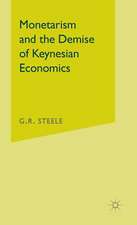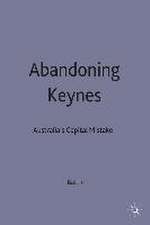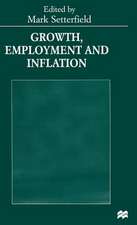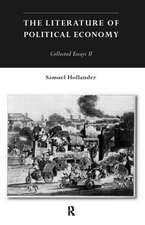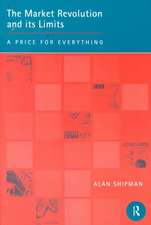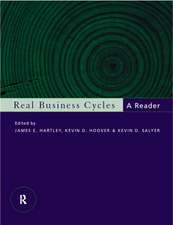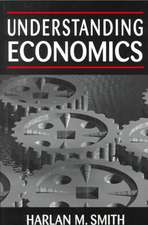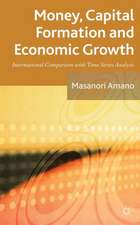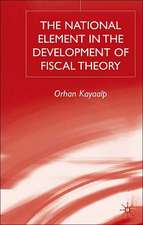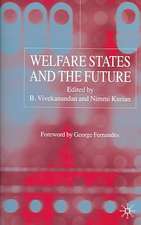The Theory of Political Economy: Palgrave Classics in Economics
Autor W. Jevonsen Limba Engleză Paperback – 29 noi 2013
Preț: 459.00 lei
Nou
Puncte Express: 689
Preț estimativ în valută:
87.83€ • 91.70$ • 72.69£
87.83€ • 91.70$ • 72.69£
Carte tipărită la comandă
Livrare economică 04-18 aprilie
Preluare comenzi: 021 569.72.76
Specificații
ISBN-13: 9781137374141
ISBN-10: 1137374144
Pagini: 339
Ilustrații: LXXX, 339 p.
Dimensiuni: 140 x 216 x 38 mm
Greutate: 0.52 kg
Ediția:2013
Editura: Palgrave Macmillan UK
Colecția Palgrave Macmillan
Seria Palgrave Classics in Economics
Locul publicării:London, United Kingdom
ISBN-10: 1137374144
Pagini: 339
Ilustrații: LXXX, 339 p.
Dimensiuni: 140 x 216 x 38 mm
Greutate: 0.52 kg
Ediția:2013
Editura: Palgrave Macmillan UK
Colecția Palgrave Macmillan
Seria Palgrave Classics in Economics
Locul publicării:London, United Kingdom
Cuprins
PART I: INTRODUCTION 1. Mathematical Character of the Science 2. Confusion Between Mathematical and Exact Science 3. Capability of Exact Measurement 4. Measurement of Feeling and Motives 5. Logical Method of Economics 6. Relation of Economics to Ethics PART II: THEORY OF PLEASURE AND PAIN 7. Pleasure and Pain as Quantities 8. Pain the Negative of Pleasure 9. Anticipated Feeling 10. Uncertainty of Future Events PART III: THEORY OF UTILITY 11. Definition of Terms 12. The Laws of Human Want 13. Utility is not an Intrinsic Quality 14. Law of the Variation of Utility 15. Total Utility and Degree of Utility 16. Variation of the Final Degree of Utility 17. Disutility and Discommodity 18. Distribution of Commodity in different Uses 19. Theory of Dimensions of Economic Quantities 20. Actual Prospective and Potential Utility 21. Distribution of a Commodity in Time PART IV: THEORY OF EXCHANGE 22. Importance of Exchange in Economics 23. Ambiguity of the term Value 24. Value Expresses Ratio of Exchange 25. Popular use of the term Value 26. Dimension of Value 27. Definition of Market 28. Definition of Trading Body 29. The Law of Indifference 30. The Theory of Exchange 31. Symbolic Statement of the Theory 32. Analogy to the Theory of the Lever 33. Impediments to Exchange 34. Illustrations of the Theory of Exchange 35. Problems in the Theory of Exchange 36. Complex Cases of the Thoery 37. Competition in Exchange 38. Failure of the Equations of Exchange 39. Negative and Zero Value 40. Equivalence of Commodities 41. The Gain by Exchange 42. Numerical Determination of the Laws of Utility 43. Opinions as to the Variation of Price 44. Variation of the Price of Corn 45. The Origin of Value PART V: THEORY OF LABOUR 46. Definition of Labour 47. Quantitative Notions of Labour 48. Symbolic Statement of the Theory 49. Dimensions of Labour 50. Relations of Economic Quantities 51. Various Cases of the Theory 52. Joint Production 53. Over-Production 54. Limits to the Intensity of Labour PART VI: THEORY OF RENT 55. Accepted Opinions concerning Rent 56. Symbolic Statement of the Theory 57. Illustrations of the Theory PART VII: THEORY OF CAPITAL 58. The Function of Capital 59. Capital is concerned with Time 60. Quantitative Notions concerning Capital 61. Expression for Amount of Investment 62. Dimensions of Capital, Credit and Debit 63. Effect of the Duration of Work 64. Illustrations of the Investment of Capital 65. Fixed and Circulating Capital 66. Free and Invested Capital 67. Uniformity of the Rate of Interest 68. General Expression for the Rate of Interest 69. Dimension of Interest 70. Peacock on the Dimensions of Interest 71. Tendency of Profits to a Minimum 72. Advantage of Capital to Industry 73. Are Articles in the Consumers' hands Capital? PART VIII: CONCLUDING REMARKS 74. The Doctrine of Population 75. Relation of Wages and Profit 76. Professor Hearn's Views 77. The Noxious Influence of Authority
Recenzii
"Jevons's The Theory of Political Economy marks the watershed between classical and neoclassical economics. Jevons provided lengthy arguments for the mathematization of economic theory as well as for the priority of the utility theory of value in place of the labour theory of value that had been central to economics since John Locke. This book will enlighten any reader wishing to understand the essential nature of contemporary mainstream economics. And like all pathbreaking works, it also raises questions that have since been forgotten, questions about the measurement of utility, the justification for using continuous mathematical functions, or the definition of capital. Spending time with Jevon's brilliant and polymathic mind will amply reward any inquisitive reader."
Margaret Schabas, Professor of Philosophy, University of British Columbia, Canada
Margaret Schabas, Professor of Philosophy, University of British Columbia, Canada
Notă biografică
William Stanley Jevons (1835 –1882) is known by many as the founder of the mathematical method revolution in economics. Originally educated in the natural sciences Jevons turned his attention to the moral sciences during his stay in Australia in the 1850s. In 1866 he was elected Professor of Logic and Mental and Moral Philosophy and Cobden Professor of Political Economy in Owens College, Manchester, UK. In 1876 he accepted the position of Professor of Political Economy at University College, London, UK. Jevons published The Theory of Political Economy in 1871. At the time of his death in 1882 he was regarded by many as a thought leader in the spheres of logic and economics.
